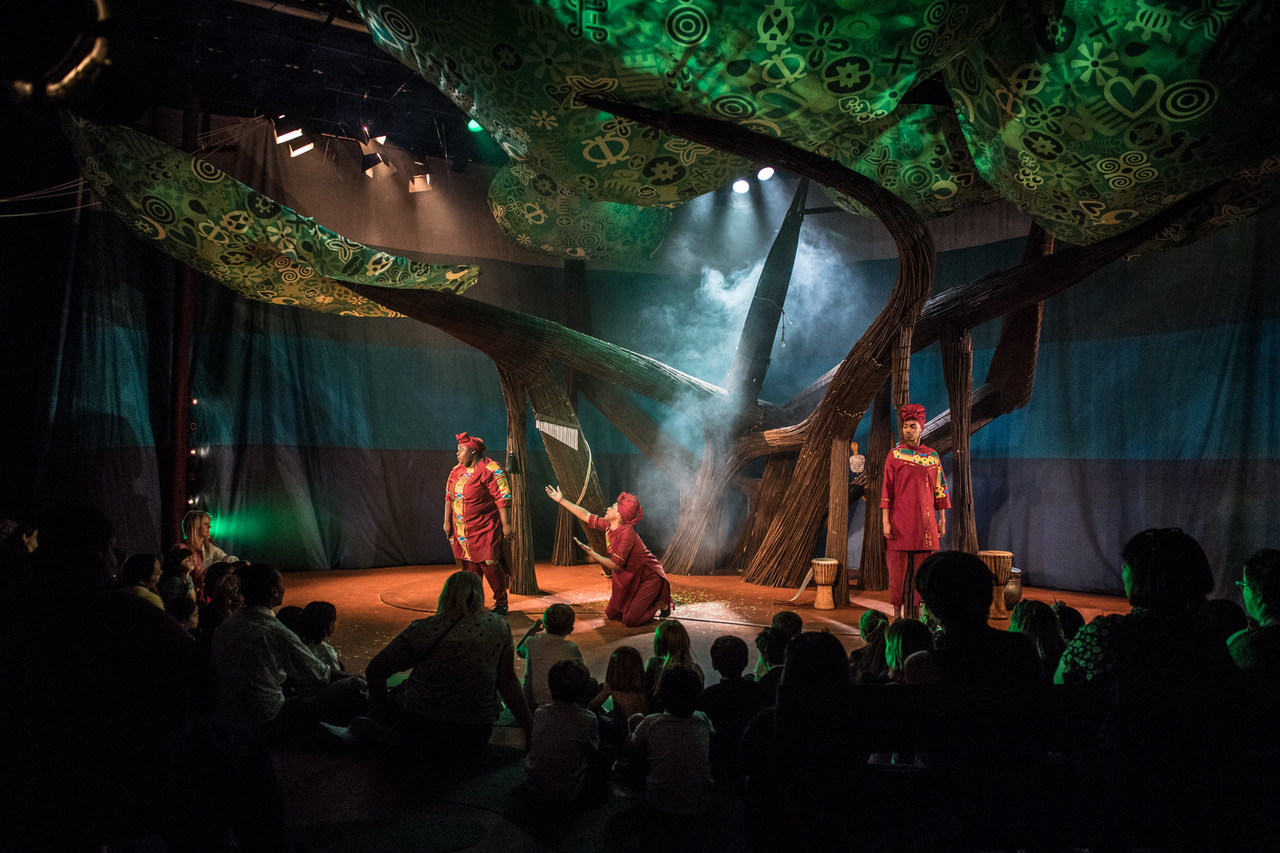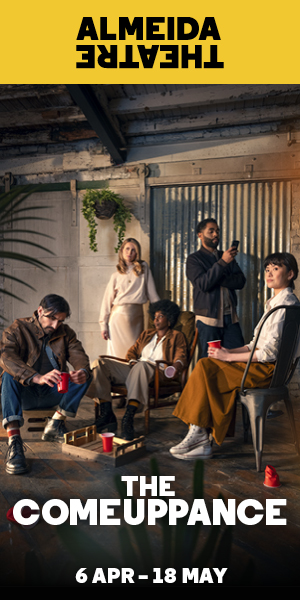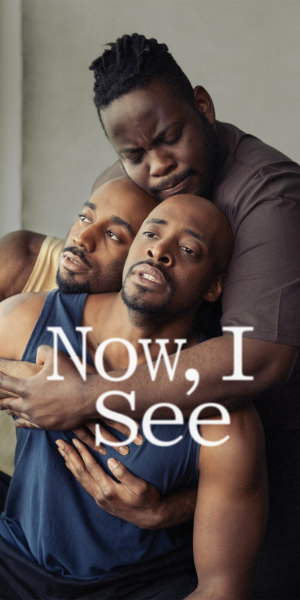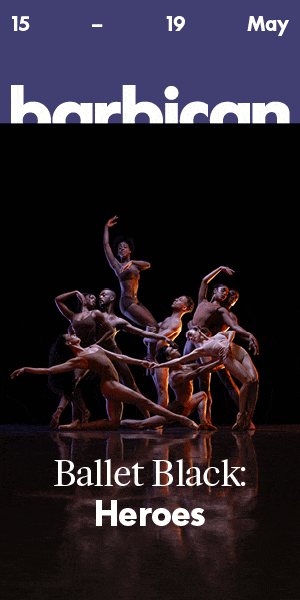As his inaugural season opens at Unicorn Theatre, artistic director, Justin Audibert, caught up with Afridiziak Theatre News founder, Sophia A Jackson. Audibert, is a busy man but he kindly took time out of rehearsals for Anansi the Spider, and during this 30-minute interview, as we sit in the Unicorn’s foyer, we discuss his new role, learning how to say ‘no’, and his early memories of theatre.
Sophia A Jackson (SAJ): How are you enjoying your role as artistic director of the Unicorn Theatre?
Justin Audibert (JA): I’m a year in the job now but what’s different is that last year it was my predecessor’s season, the brilliant, Purni Morell. Whereas this is the start of all the work that I’ve programmed. So, that’s really exciting. What’s special about the Unicorn is the sheer variety of the programming. We programme from six-month-old up to the age of 18. In a year, we try to do a show that has something for all of those different age ranges across the year. This isn’t something that many other theatres do. Usually, theatres have one family show at Christmas, but we are always looking at trying to balance that season out. I was lucky in being able to have a year where I could sit back and see how the building works, when the crunch points are, when things are a bit more relaxed and what things I wanted to change. One of the things that felt important to me is that people weren’t using the foyer like they are now, as a public space.
So, we’ve changed all the signage on the front, so it says, ‘please come in’. We’re a public space for children but anyone can use the space’. That feels important to me. We’re an Arts Council funded organisation, we belong to the people. Obviously, our primary duty of artistic care is towards young people but it’s important to me that anyone feels they can be in here and be in this space. That’s starting to reap the benefits now because now there are people using the building in other ways.
In terms of me starting to see the things I have programmed coming to fruition, it’s early days. I’ve never made a show (Anansi the Spider) as young as this before. This is my first for the 3-7 age range. I’ll be honest, I think it’s a good show. I’m also excited by Maggot Moon. It’s a show with lots of live feed, video, animation and that’s a slightly different texture and tone to some of the work we’ve had here. One of the things I want to continue that I think Purni did brilliantly was to take companies who are making work for young people and then scale them up and give them more opportunities.
We’re doing that with theatre company, How it Ended, for our show Wild. They made a lovely show called The Little Gardner, so Wild is a scaled-up show for them. Which is really exciting. It’s the idea of the Clore Theatre feeling different every time you go in there, so across the year – seating arrangements, lighting, design… The Western, is what it is and its own space and own architecture, it’s a ‘D’ shape, so you’re limited in that way, design wise but it’s a great space. What I want us to do with the studio, is that every time you see a show, it’s a new adventure and that it’s completely different and it’s transformed. That’s the magic and joy of being able to programme so much.
One of the things I’ve always been interested in is new versions of old things. Our brief here is new work. That can encompass new telling’s of old stories. If you look at the canon of what that means in young people’s theatre, how often does it include stories from outside of Europe? Well, not as much as it should.
The other thing that’s incredible about this place is the number of shows we make in a year (12-15). That’s a lot of shows. That turnover of artists through the building, I love that. I get to learn from other people and people I admire. So, the End of Eddy, which was programmed last season, is going to BAM in America and Melbourne International Arts Festival. Basically, it’s really good and I’m really enjoying it. This year there’s pressure, because it’s my first season but also there’s excitement as well.
SAJ: What are the challenges associated with coming in and having to finish someone else’s programming?
JA: I couldn’t have asked for anybody to have done a better job of handing over. We had a bumper year at the box office last year so not only do I inherit nice people, I also inherited financial success, which is great. So, I could not praise Purni more in her responsibility towards the building. Also, I want to do things differently and have different artists who have not worked in the building. When I cast a play, I tend to have some people I’ve worked with before and some people I haven’t. That way I’m expanding my repertoire and I have some security of some people I’ve worked with. Then you’re balancing it out. That kind of risk management is interesting. The other thing that’s changing is the Community department but is now called Reach.
We have a school’s programme and work with a lot of young people in school groups, but the focus of our community programme, Reach, is slightly different in that it’s now about people, who for whatever reason are not going to access us through school. They are coming to us through third party public sector or third sector organisations. We are doing a project with Great Ormond Street hospital. We’ve recorded some of Aesop’s Fables, which I directed at the end of last year and we are taking it around the wards so people can listen with their families. We also have a relationship with Phosphoros Theatre Company who work with refuges and unaccompanied minors and we are running a youth theatre for refugees and unaccompanied minors so that will be every Tuesday night, here. Really exciting.
Our youth work is targeted a bit more specifically at groups that don’t access theatre in a conventional way. We are a public institution and we should be reaching all parts of the public. Trying to put that idea at the core of what we do; is really important to me. I would do more of that work but it’s also about what finances allow you to do. In a dream scenario, that Reach programme expands and expands all throughout my tenure here.
SAJ: What have been your highlights since you joined Unicorn Theatre?
JA: The Show in Which Hopefully Nothing Happened by a Dutch company called Artemis, it was basically like Beckett for kids. They loved it. It was an absolutely brilliant show and deconstructed what a piece of theatre is. It had the most brilliant responses. There were three reasons why I took this job. One, because everyone who works here, works here because they believe in the mission of the building which is to make great art for young people. I’ve worked in plenty of theatres where not everyone 100 per cent believes in the mission of the building. Here, everyone does. Two, the audience will tell you when stuff works in a much more honest way than any other place. If they are bored, they will tell you, but the response and feedback is immediate, so you can get better.
There’s no polite clapping, if they are not interested, they are not interested. The third reason is the sheer number of artists and programming that you can work with. No one ever tells you this stuff, tricky things are existing commissions that you’ve been handed over that you may not want to programme. What I’m starting to learn is that you have to learn to say no to people and it’s difficult. Hopefully, I will just get better and better at doing that. I also think that the only times you feel lousy are when you don’t trust your own instincts. In terms of being an artistic director, no one tells you about the sheer amounts of personnel and human resources issues that you’re dealing with. Just because you can direct a play and read a play, and think a play’s good, doesn’t mean that you can deal with someone’s deep, personal problems… Those are challenges but basically, I enjoy them.
The thing about working here, that is a real privilege, is that everyone believes in what we do, as in making art for young people. That’s pretty great.
I found last year really difficult in that it was less that I was looking after the programme but more that I was still finishing my existing freelance commitments. This meant trying to be in a lot of different places at once. That’s something that’s changed about me, I used to believe that like most people, that teleportation would be the most useful superpower. No! It’s multiplication, the ability to multiply yourself. That would be really useful. You do spend a lot of time running around the building going ‘Is everyone, alright?’ and realising you’re missing loads of things.
I guess you just get better at that and you probably feel less like you’re letting people down all the time. Dealing with that and going, ‘I God I haven’t replied to that email that someone sent me four weeks ago’, is tough. I hate that feeling. Also, I made a decision that would meet anyone who had an idea. I don’t know how realistic that is. That was my intention but there is only one of me. So, I’m being a bit more selective with that but trying to fulfil it a lot.
SAJ: Tell us about your latest production, Anansi the Spider, your first production of the season.
JA: One of the things I’ve always been interested in is new versions of old things. Our brief here is new work. That can encompass new telling’s of old stories. If you look at the canon of what that means in young people’s theatre, how often does it include stories from outside of Europe? Well, not as much as it should. So, super important to me and my own heritage, I heard these stories growing up from my Jamaican family, and so it’s really important that these stories get heard and told. When I started researching, I didn’t know that originally these stories were actually from West Africa, and they travelled across the Caribbean, and they changed, and mutate. There’s something similar in the way the production works as well.
We start in West Africa, and then we go to the Caribbean, and then we come to London because that’s the journey these stories have taken. However, the journey that these stories travelled from West Africa to the Caribbean is less than ideal, and there are issues with the journey they made from the Caribbean to London, but it felt really important to me that was a thing that we honoured, that that was integral in how we made the show. There are little political moments in it, they are small, but they are there, and hopefully young people will go away and ask questions about why that thing was in there and I’m really interested in that. It felt important to me that this character Anansi who lives in this world where they understand what right and wrong is but he’s not a morally clear character, sometimes they are good and sometimes a force for mischief and madness. It feels really fun to me.
I also wanted to tell the story with three female actors. It felt more interesting to me. Even though it’s a spider, you see it as a male character, there was a fun, gentle, satirical moments that we think with a female cast is kind of enjoyable because it’s three women being slightly mischievous. The only thing I knew was that I wanted a big tree in it and this the second time I’ve worked with Jan. I had a great collaboration with Sadeysa Greenaway-Bailey and working out what that tree was and then the canopy of the tree is all Adinkra symbols, there is one symbol which is a like a five point star slash wheel spoke that is Anansi and it means wisdom. That was really important to us and likewise with the costumes, there’s a myth that Anansi gave humans the gift of Kente cloth. That isn’t in our show but that felt like a great thing to represent so that’s in some of the costume, there’s just things like that.
It was great fun to research as a show. To look at trees that exist in both Ghana and Jamaica and doing stuff like that is just great… Also, the Adinkra symbols are also part of the Maroon culture in Jamaica… One of the things I’m incredibly interested in, is the movement of people across the planet. It really fascinates me and what it means and what home is. So, this was a great show to talk about that in a nice, loose, fun and enjoyable way. To have some reference to that.
SAJ: Why should people come and see Anansi the Spider?
JA: It’s a brilliant ensemble of three actors. They are fantastic. It’s funny and naughty. It’s a really immersive show because the audience is literally sat in it under it and are a part of it. There’s plenty of moments of them joining in a little bit. The quality of the craftsmanship in the design is really beautiful… Duramaney Kamara’s written some great music that does that whole journey from West Africa, there’s Kora played in it and then we go to the Caribbean and there’s Calypso. Then we come to London and there’s contemporary British music, which I think it’s great. Anansi is a fantastic character because everything the character does has a kind of joy to it whether they are being good or bad, they are having a good time, there’s something really fun about that.
SAJ: Could you share some of your own early theatre experiences and do you remember the first time you went to the theatre?
JA: Oh, yes! It was a very clear experience. I think this is why I’m a theatre director. I went to the Kenneth More theatre in Ilford for my 6th birthday. I saw the Sooty and Sweep show live on stage, and I got to go on stage and make my own birthday cake. ‘Izzy Wizzy let’s get busy’ and then my birthday cake appeared. That is probably why I work in theatre. No one in my family works in theatre. Then we used to go to musicals and pantomimes quite a bit so I remember seeing Antony Newly play Fagin in Oliver, I went to the panto at the Palladium, you know, the massive one, and I saw Lenny Henry, then when I was 12, my aunt who I was very close to, who lived in the Midlands, she took me to the RSC, to see Love’s Labour’s Lost, and I just loved it.
I used to believe that like most people, that teleportation would be the most useful superpower. No! It’s multiplication, the ability to multiply yourself. That would be really useful.
So, she would take me every year to see something as a treat and then when I sent to Sheffield University, one of my close friends, Sam, we used to go to the theatre a lot, I started to read about theatre and then do things like buy a 10p standing ticket to see things at the Royal Court. That was the journey really, the two things I’m really interested in making is new plays and Shakespeare in a contemporary space.
SAJ: How has your day to day life changed since becoming an artistic director?
JA: The thing that is very, very different is that when I was a freelancer, whatever I wanted to achieve, I would go in and achieve a certain amount of them. The difference is a lot of the time as an artistic director, you’re reactive rather than proactive. I might have 10 things on my to do list, but someone can grab me at any point, and I have to go and deal with it. That’s a joy in a way, as the difference between me and the person at the box office or on-stage door is very little and if there’s a problem, they come and tell me about it. That’s good because it means I know what’s going on, it also means that I often get pulled into other people’s situations. Bit by bit, I hope I’m getting better at that and compartmentalising. The thing about working here, that is a real privilege, is that everyone believes in what we do, as in making art for young people. That’s pretty great.































